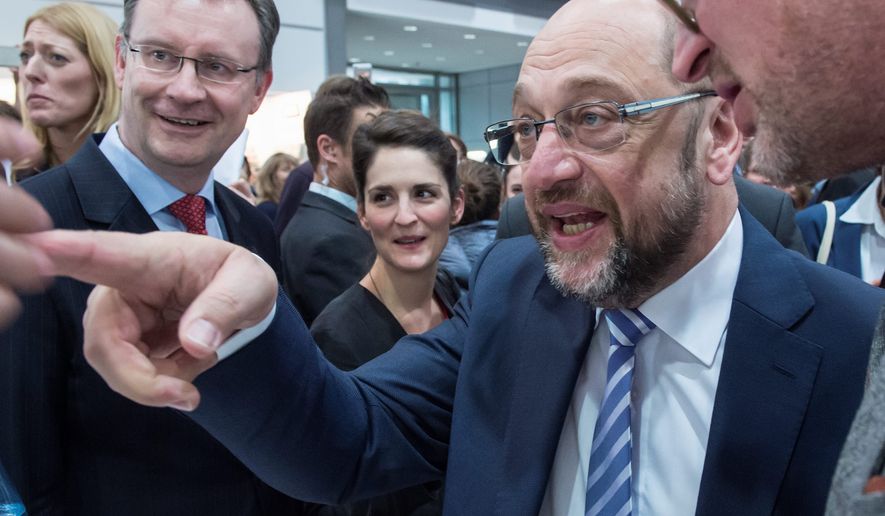BERLIN — An early tell on Europe’s most important election this year comes this weekend when the first of three German state elections gauges Chancellor Angela Merkel’s political appeal and provides a first real-world electoral test for Martin Schulz, the charismatic new leader of Germany’s resurgent Social Democrats.
Analysts are already saying a big win for the Social Democrats could trigger a waterfall effect, carrying Mr. Schulz to victory in September’s national elections and blocking Ms. Merkel’s hopes for a fourth term as the continent’s dominant political leader.
Ms. Merkel’s center-right Christian Democrats have controlled Saarland, a small, predominantly Catholic state with about 1 million residents on the border with France, since the turn of the century. But Sunday’s vote may buck the trend.
Since Mr. Schulz, the outspoken former president of the European Parliament, announced his candidacy for chancellor back in January, his center-left Social Democrats have unexpectedly made strong gains in polls.
His party is now within striking distance of Ms. Merkel’s majority for the first time since she took office in 2005. The latest polls from Germany’s Forsa Institute show the Socialists polling at 31 percent nationally, just behind the center-right Christian Democrats with 34 percent.
Mr. Schulz’s popularity has had a trickle-down effect in Germany’s 16 federal states, where longtime Christian Democratic strongholds like Saarland are now in serious contention.
Should the Socialists, known as the SPD, outmaneuver Ms. Merkel’s party in the state, it could create a domino effect for the two remaining regional elections this year, giving the 61-year-old Mr. Schulz important momentum coming into September’s federal elections.
“The ‘Schulz effect’ is injecting a new dynamic into this election,” said Olaf Boehnke, an associate fellow with the German Council on Foreign Relations in Berlin. “If the Social Democratic Party becomes the biggest and strongest party in Saarland, then they’ll ride a wave of momentum. This may be the first step for Schulz to win the chancellorship.”
Ms. Merkel has largely been considered unbeatable at the ballot box during her almost 12-year tenure in Berlin.
Her no-nonsense attitude, strict European ideals and fiscal conservatism are widely seen as critical to Germany’s prowess as the EU’s economic powerhouse. However, her popularity took a hit because of widespread backlash over her decision to open the country’s border to more than 1 million Syrian and other refugees fleeing war and other hardship in the Middle East and other global hot spots.
That vulnerability gave rise to the far-right Alternative for Germany, which stands to enter its 11th federal state legislature on Sunday.
But, in a development many had not anticipated, Ms. Merkel’s policies provided an opening for Mr. Schulz.
Since replacing Foreign Minister Sigmar Gabriel as the Socialists’ party head — the Socialists are now a junior partner in a grand coalition under Ms. Merkel and her conservative bloc — Mr. Schulz has sought to bring his party back to its social justice roots as a champion of Germany’s working poor.
Sharp contrast
Mr. Schulz’s fiery rhetoric and passionate optimism present a stark personal contrast to the chancellor, who is often perceived as a calculated master politician.
That juxtaposition has particularly attracted young voters to the SPD, contributing to its 10 percentage point jump in the polls since Mr. Schulz announced his candidacy. But plenty of Germans remain unconvinced that he would be a good chancellor, political observers said.
“It’s still an open question how voters feel about the potential competency of Merkel versus Schulz,” said Ralf Welt, a managing partner with Dicomm Advisers, a political consultancy and polling firm in Berlin. “But it’s important to note that if a direct election were to take place in March, 34 percent of Germans would give Merkel their vote while 50 percent would give it to Schulz.”
Saarland has become the first of three preliminary skirmishes to be fought between Ms. Merkel and Mr. Schulz before the September general election.
Sitting Christian Democratic Governor Annegret Kramp-Karrenbauer enjoys soaring popularity for her clever appeals to social conservatism and working-class economics in the largely industrial state.
But Ms. Kramp-Karrenbauer is challenged by newcomer Anke Rehlinger. A largely unknown politician before now, she and the Socialists have dramatically benefited from what the German media has called the “Schulz-effect.”
“Were the election to take place today, the Christian Democrats could expect 35 percent, while the SPD would have prospects of 34 percent,” said Mr. Welt. “She’s really benefited from the Socialists’ decision to put her on the campaign trail” with Mr. Schulz.
While the Socialists continue to ride a wave of Schulz-mania, the Christian Democrats will play to its strengths in Saarland by linking their local candidate and their national heavyweight, Ms. Merkel. The chancellor has walked back some of her most pro-immigration policies in the face of rising popular opposition.
“The Christian Democratic Party will pretty much focus on politics and policy — stopping the Alternative for Germany, refugees, migration — while also presenting Merkel as a respected world leader,” said Mr. Boehnke.
Playing to the media’s perceptions of Ms. Merkel as the new champion of Western liberal values and highlighting her achievements may be enough to give her a win in Saarland.
But moving on to regional elections in the northern state of Schleswig-Holstein on May 7, and North Rhein-Westphalia, Germany’s most populous state, on May 14 may prove a difficult challenge for the chancellor.
The Socialists now control Schleswig-Holstein and North Rhein-Westphalia, often called the “German California” with its almost 18 million residents, roughly one-quarter of Germany’s population, usually leans left. It’s also Mr. Schulz’s home state, making him the likely favorite, said Mr. Boehnke.
That may present a winning combination that Ms. Merkel and the Christian Democrats, despite her personal prestige, simply can’t overcome.
“They really don’t have this kind of genius idea of how to defeat him,” said Mr. Boehnke. “They’re bound and linked to Angela Merkel. The only chance they have is to place all their bets on this one card.”




Please read our comment policy before commenting.